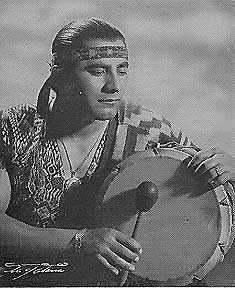
 |
|
|
| Home
| Front Page
| News
| Documents | Environmental
| Archive
| Links
| About Us |
|
El Indio Araucano, an example of overcoming adversity By Reynaldo Mariqueo - November 28, 2011
When he was about eight years old he had an accident which left him blind, and was subsequently admitted to the school of the Protectorate Society "Santa Lucia" in Santiago for blind and deaf children, where he remained for about two years. It was the saddest time of his life, a nightmare, he wept constantly, until one day he decided to escape. Three years later his eyes were operated on. The results were disappointing as it only enabled him to see silhouettes. Not until a 1984 operation in the United States did he regain full vision. El Indio Araucano married three times, had a total of five children, three boys and two girls, although the youngest girl sadly died. He now resides in New Jersey, USA and is 87 years of age, however, he believes that he is in fact 90 as a result of a clerical error at the Civil Registry Office. He suspects this as his younger brother is actually 3 years older than him on paper. Despite his advanced age, he has a tremendous ability to remember and recall facts and artistic experiences of the past, which took him to almost every country in Latin America and some in Europe. You can still feel his energy and vitality through his powerful voice, which made him world famous. Looking at his photographs one can see the features of the Chilean ‘mestizos’ (mixed race people), who make up over 70% of the total population. His Araucanian or Mapuche side, which he says he is proud of, is visible in his appearance. Although his surname is of Spanish origin, his parents were peasants who farmed the land and as a child his closest friends were Mapuche children from neighbouring communities. He says he was born, grew up and played with them and felt like a Mapuche, so much so that his family and his friends gave him the Mapuche nickname "Cayupi." He forcefully affirms that he wanted to take the stage name of El Indio Araucano "to assert my race", in recognition of the people he admired and whose causes he identified with. He grew his hair to use the trarilonko (headband) and wear at his shows, which included songs related to indigenous peoples. He used the chiripa (a type of clothing worn around the hips) and the poncho over a period of time in which other Latin-American artists of his professional stature wore hair gel and the latest European suits. Osvaldo began his artistic career in the late 1930s. At 8 years old he studied, sang and worked at the farm, helping to take lunch to the workers performing their tasks on his parents’ farm. From a young age he secretly played his father’s harmonica and, at age 13, was invited to sing for the first time in a local radio station in Los Angeles (region of Araucania), he went on to win first prize as the best singer in the city. But his career really began to take off when he was about 15 years old, in 1938, after winning a competition called “The Golden Voice of Chile” with the song "El pregon de las Flores", an event which was held at the Caupolican Theatre of Santiago. In 1941, after a performance at the Carrera Theatre in Rio Gallegos (Argentina), he perceived that the spectators were waiting outside the theatre, and therefore was persuaded by the cheers of his followers to sing without a microphone in the open air and on a cold winter night. As a result he lost his voice for over five months. After his voice recovered he resumed his career but once more suffered a setback when he lost his voice for the second time. In order to survive in Santiago he had to work in various jobs. Among these jobs, despite his blindness, he managed to work as a butcher. After he got his voice back, he rushed back to the stage. Under the name of the El Indio Araucano, he became one of the most outstanding Latin American singers. He traveled to Argentina, Venezuela, Mexico, Cuba, Spain, Panama and many other countries in South America, where he was hailed by increasingly large audiences, whom he captivated and seduced with his voice and songs. It is important to highlight that, in addition to the popular music of the time, he included in his repertoire some pieces with indigenous melodies and lyrics like "Lamento Mapuche", "Regalo de Amor-Guarania", "Rito Mapuche", "Recuerdos de Ipacarai" and "Un grito en la Montaña." Through his lyrics and his dress he conveyed an indirect message that summed up Mapuche culture and feelings of the time, while addressing the problems and pains suffered by the indigenous population from the unrelenting harassment that were subjected to. His artistic career includes performing on numerous radio and television stations on the continent, including "Radio Belgrano" and radio "The World" of Buenos Aires, Argentina (1950-1953), Radio Caracas and Victor Saum’s TV show of the early 1950s. In Cuba where he lived from 1955-67, he also worked in Radio Progress and the TV Channel CMQ. Between the years 1966-67 he lived temporarily in Spain and from there he went to the United States. In Colombia, in 1948, he won a Disco de Oro (gold record) for the song "Cuando muere la noche” (when the night dies), but he said he hasn’t ever received it because he did not have a fixed address and was traveling from city to city, from country to country. He notes that in Chile he was very popular in the first half of the 40's, but his native country eventually forgot him, to the extent that today he is virtually unknown there, as is the late Rayen Quitral (RIP), whose Mapuche roots were concealed by the Chilean media. It is important to stress that in the 1920s, around the time that Indio Araucano was born, the Mapuche were recovering from the holocaust that they were subjected to, decades before, by the Chilean and Argentinean states, causing one of the bloodiest tragedies committed against an Indian nation in Latin America. In order to justify the military occupation and dispossess the Mapuche people from their land and natural resources, both states began a campaign to demonize the subjugated people, added to which an aggressive process of assimilation threatened to destroy their cultural identity. Keep in mind that Chile was by and large a country of immigrants. Without a cultural identity of its own, it strove to construct one by copying or imitating European culture, hence their intent on concealing the ancient culture of native peoples. This resulted in the vast majority of Chileans hiding, even to this day, to a lesser extent, their indigenous roots. But it is fair to say that today in Chile there is a greater tolerance for cultural diversity, thanks to contributions by artists such as El Indio Araucano. Presumably, for the Chilean authorities, the Indio Araucano proved troublesome. He was paraded around the continent’s most important art scenes with the name "Indian Araucano" using indigenous dress and singing songs in a native language, using words associated with the enslaved peoples of the continent. For that age, it must have been a real affront to those states like Chile and Argentina which were engaged in wiping out Mapuche culture. This must certainly have been a real challenge for artists such as El Indio Araucano and Rayen Quitral, the latter also of the same period. Artists such as El Indio Araucano and Rayen Quitral gave heart to writers and poets who were inspired to include issues related to the Mapuche amongst their compositions. It is no exaggeration to say that, at that time, they were true subversives, although perhaps not as much as the protest songs of the 60s and 70s by Violeta Parra and Victor Jara, which expressed the harrowing reality of the Mapuche. It was a period in history where the oppressed voices were brutally silenced, artists only dared to lament the injustice but not fight it, yet the suffering of the Mapuche people, reduced to poverty, abandonment and helplessness can be seen in the lyrics of their songs. The lyrics of the songs express that sentiment captured by the few socially conscious artists who then sheepishly raised their voice, the song "Mapuche lament", beautifully interpreted by the Indio Araucano, expresses the grief of the Mapuche after the hunt, plunder and state of oppression in which it was said: ... "And when the night comes and the sun hides in the mountains, a tear of a man, tumbling down in secret." Here's another that he composed in the years 1934-1935 under the title Araucano Rite, it says .. "Oh God, because I was born an Indian, I am tainted; with slow steps I make my way home." And the song India Quillay, says: "One hears your cries from the forest to the sea, and I can even feel it as I sing this song." On the other hand Rayen Quitral, who wore traditional Mapuche costume with pride wherever she went, sang Ignacio Verdugo's poem El Copihue Rojo (the red copihue) with passion ... "I bloodied the chains, that the Indian shattered, their tears were covered by the mountain snow, I am the Araucanian blood, that blossoms from the tears”. There is no doubt that El Indio Araucano and Rayen Quitral discreetly symbolized the cultural resistance of indigenous peoples, because, in their own way, they were exploiting and promoting the culture of all of the peoples of the continent. Perhaps that is why Chile acted in this way, so far there has been no Chilean institution that has recognized El Indio Araucano’s enormous musical and artistic contribution, while Rayen Quitral died in Santiago in 1979, in "misery and neglect", as recorded by a document found on the Internet. As Mapuche we can only pay tribute to these artists, especially El Indio Araucano, who through his songs made a valuable contribution to keeping alive the memory of a people devastated and humiliated by those who took their land, freedom and independence by the barrel of a gun. _____________________ Translated by: Ian Riddell
|
| |
||
|
||
